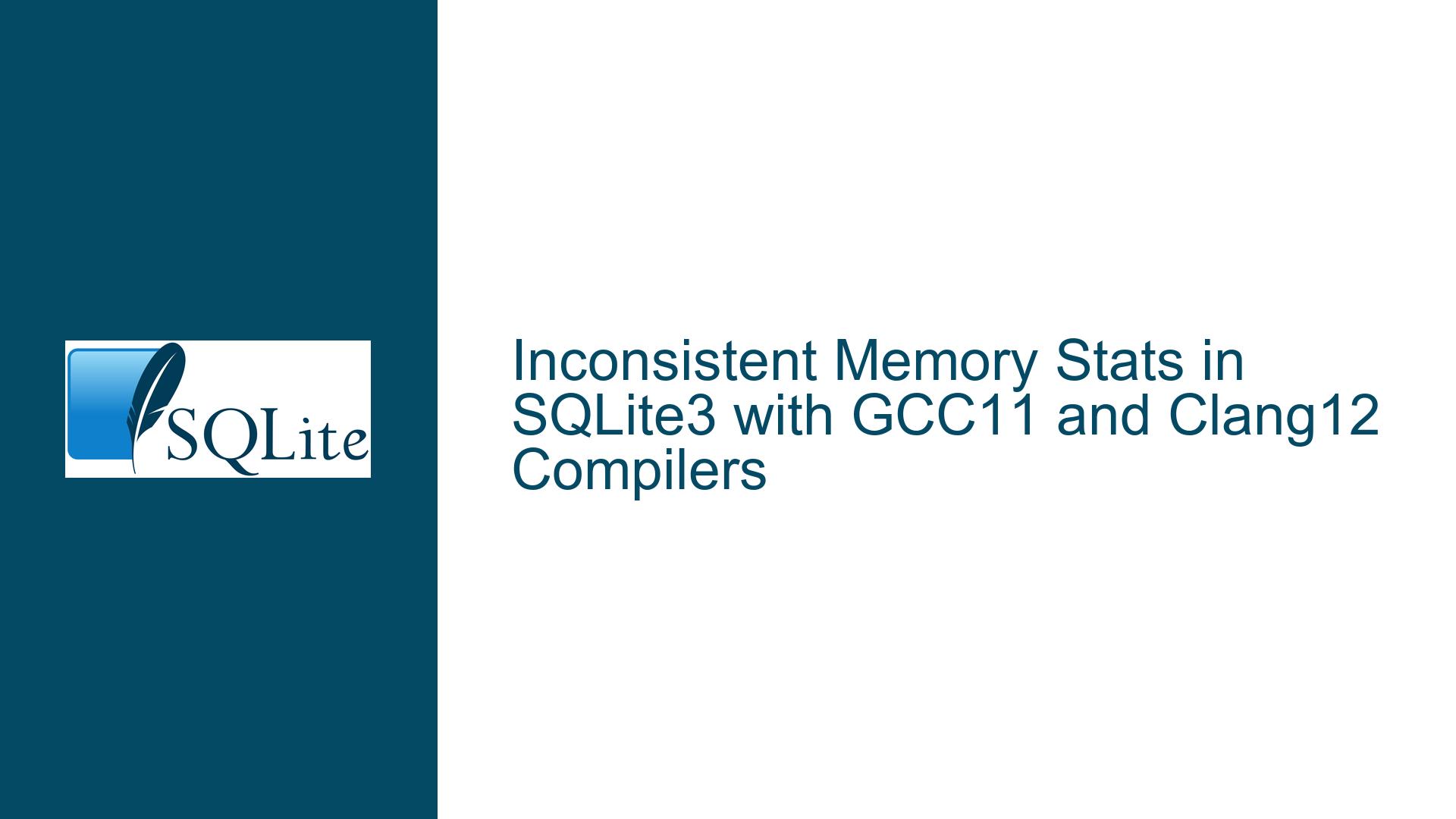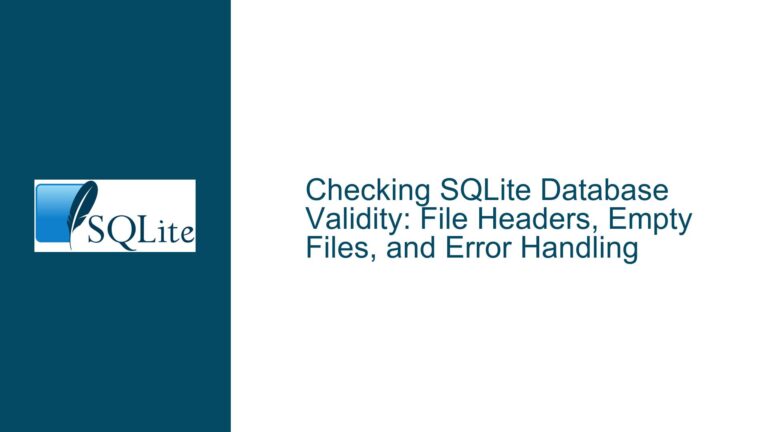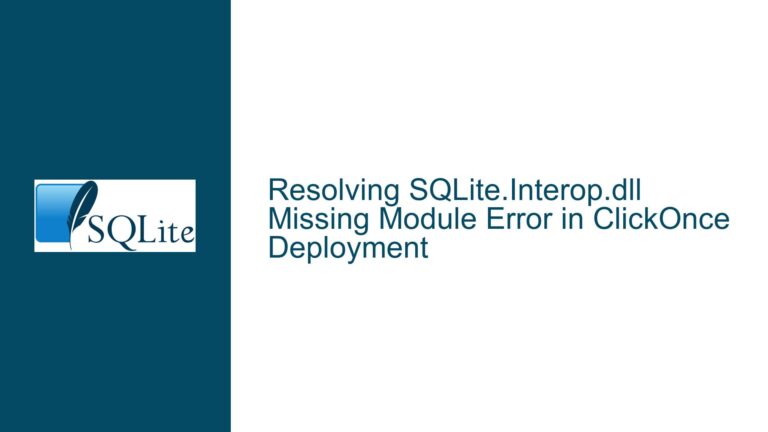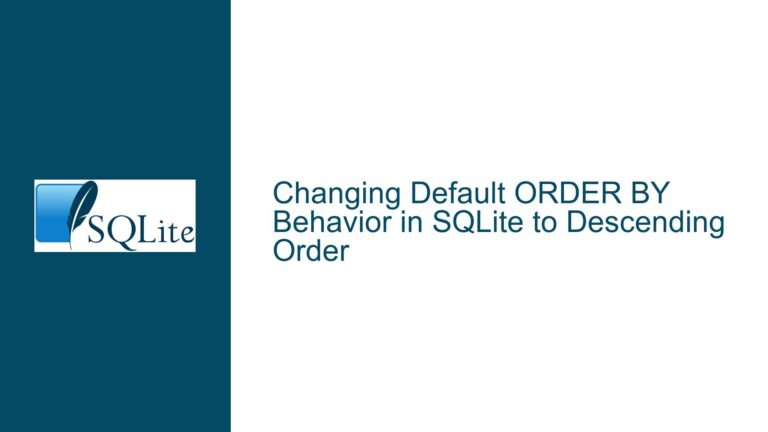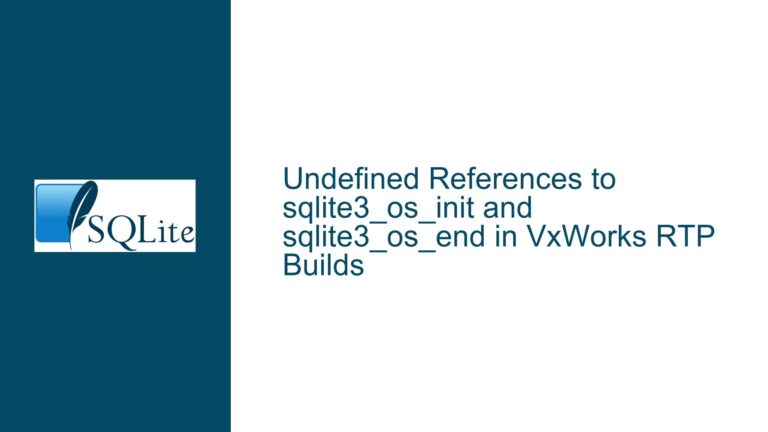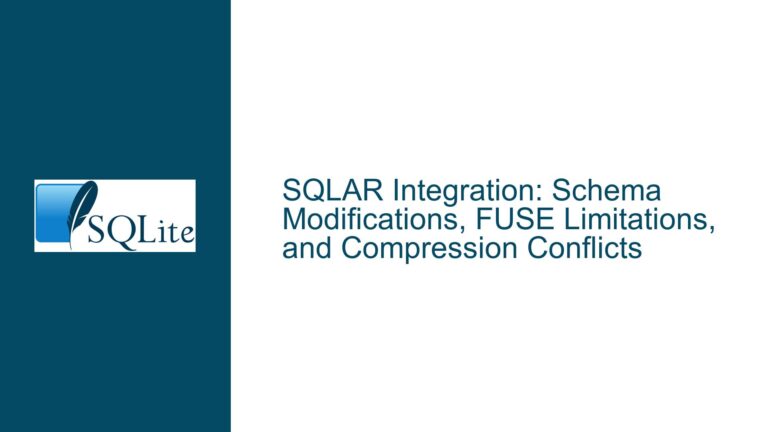Inconsistent Memory Stats in SQLite3 with GCC11 and Clang12 Compilers
Issue Overview: Memory Statistics Discrepancies Between GCC11 and Clang12 Compilers
When compiling SQLite3 with different compilers, specifically GCC11 and Clang12, users may observe inconsistencies in the memory statistics reported by the sqlite3 -stats command. These discrepancies arise even when the same SQLite version, compiler arguments, and input scripts are used. The issue is particularly noticeable when running crafted SQL inputs, such as those generated by a fuzzer, and comparing the resulting memory usage statistics.
The core of the problem lies in how different compilers handle memory allocation, optimization, and debugging assertions. SQLite3, being a highly optimized and lightweight database engine, relies on precise memory management to ensure performance and stability. When compiled with debugging flags like -DSQLITE_DEBUG=1, the resulting binary includes additional assertions and checks that can influence memory usage patterns. These patterns may vary between compilers due to differences in their optimization strategies, memory alignment, and handling of debugging constructs.
The specific compiler arguments used in this scenario, such as -DSQLITE_MAX_LENGTH=128000000 and -DSQLITE_MAX_MEMORY=25000000, are designed to control the maximum allowable memory usage and prevent out-of-memory (OOM) errors. However, these settings do not eliminate the inherent differences in how GCC11 and Clang12 manage memory internally. As a result, the memory statistics reported by SQLite3 can differ significantly between the two compilers, even for identical inputs.
Possible Causes: Compiler-Specific Memory Allocation and Optimization Strategies
The discrepancies in memory statistics between GCC11 and Clang12 can be attributed to several factors, each rooted in the unique behavior of the compilers. Understanding these factors is crucial for diagnosing and addressing the issue effectively.
Compiler Optimization Levels: GCC11 and Clang12 employ different optimization strategies, even when the same optimization level is specified. These strategies can affect how memory is allocated, reused, and freed. For example, Clang12 might aggressively inline functions or eliminate redundant memory allocations, while GCC11 might prioritize stack usage over heap allocations. These differences can lead to variations in the reported memory statistics.
Debugging Assertions and Checks: The
-DSQLITE_DEBUG=1flag introduces numerous assertions and checks into the SQLite3 codebase. These assertions are intended to catch programming errors and ensure correctness during development. However, compilers treat debugging constructs differently. GCC11 might retain more debugging information, leading to increased memory usage, while Clang12 might optimize away certain checks, resulting in lower memory consumption.Memory Alignment and Padding: Compilers may use different memory alignment and padding strategies to improve performance or comply with platform-specific requirements. These strategies can influence the size of data structures and the overall memory footprint of the application. For instance, Clang12 might align structures to 16-byte boundaries, while GCC11 uses 8-byte alignment, leading to differences in memory usage.
Heap Management and Allocation Patterns: GCC11 and Clang12 use different heap management algorithms, which can affect how memory is allocated and freed. For example, Clang12 might use a more efficient memory allocator that reduces fragmentation, while GCC11 might prioritize allocation speed over fragmentation control. These differences can result in varying memory statistics, especially under heavy load or with complex queries.
Compiler-Specific Extensions and Features: Both GCC11 and Clang12 include compiler-specific extensions and features that can influence memory usage. For example, Clang12’s support for AddressSanitizer or its advanced loop optimization techniques might alter memory allocation patterns. Similarly, GCC11’s support for link-time optimization (LTO) or its handling of thread-local storage (TLS) can impact memory statistics.
Troubleshooting Steps, Solutions & Fixes: Addressing Memory Statistics Discrepancies
To resolve the inconsistencies in memory statistics between GCC11 and Clang12, a systematic approach is required. The following steps outline the process for diagnosing and addressing the issue:
Disable Compiler Optimizations: Begin by disabling compiler optimizations for both GCC11 and Clang12. This can be achieved by setting the optimization level to
-O0(no optimization). By doing so, you eliminate the influence of compiler-specific optimization strategies and focus solely on the baseline memory usage. Compare the memory statistics generated by both compilers in this configuration. If the discrepancies persist, the issue is likely related to fundamental differences in memory allocation or debugging constructs.Analyze Debugging Assertions: Examine the impact of the
-DSQLITE_DEBUG=1flag on memory usage. Temporarily remove this flag and recompile SQLite3 with both GCC11 and Clang12. Compare the resulting memory statistics to determine whether the debugging assertions are contributing to the discrepancies. If the differences diminish or disappear, consider refining the debugging flags or using conditional compilation to enable assertions only for specific modules.Evaluate Memory Alignment and Padding: Investigate the memory alignment and padding strategies used by GCC11 and Clang12. Use tools like
paholeorgdbto inspect the layout of data structures in the compiled binaries. Identify any significant differences in alignment or padding that could affect memory usage. If necessary, adjust the alignment settings or use compiler-specific attributes (e.g.,__attribute__((aligned))) to ensure consistent memory layouts.Profile Heap Usage: Profile the heap usage of SQLite3 when compiled with GCC11 and Clang12. Use tools like
valgrindorheaptrackto monitor memory allocations, deallocations, and fragmentation. Compare the heap profiles to identify any patterns or anomalies that could explain the discrepancies. If one compiler exhibits excessive fragmentation or inefficient allocation patterns, consider tuning the heap management settings or switching to a custom memory allocator.Test with Simplified Inputs: Reduce the complexity of the input SQL script (
diff.sql) to isolate the source of the discrepancies. Start with a minimal set of queries and gradually reintroduce complexity. Compare the memory statistics at each step to identify the specific queries or operations that trigger the differences. This approach can help pinpoint the root cause and guide further investigation.Consult Compiler Documentation and Community: Review the documentation for GCC11 and Clang12 to understand their memory management and optimization strategies. Engage with the compiler communities to seek advice or report potential issues. Compiler developers may provide insights or workarounds for specific behaviors that affect memory usage.
Consider Alternative Compilers or Flags: If the discrepancies cannot be resolved, consider using alternative compilers or adjusting the compiler flags. For example, experiment with different optimization levels (
-O1,-O2,-O3) or enable specific features like-fno-omit-frame-pointerto influence memory usage. Alternatively, explore the use of other lightweight databases or SQLite forks that may exhibit more consistent behavior across compilers.Implement Custom Memory Tracking: For advanced users, implement custom memory tracking within SQLite3 to monitor and compare memory usage at a granular level. This can be achieved by modifying the SQLite source code to include custom allocation hooks or using the
sqlite3_memory_used()API. By tracking memory usage internally, you can gain deeper insights into the discrepancies and develop targeted fixes.
By following these steps, you can systematically address the inconsistencies in memory statistics between GCC11 and Clang12. While some differences may be inherent to the compilers, a thorough investigation and targeted adjustments can help minimize their impact and ensure more reliable memory usage reporting in SQLite3.
